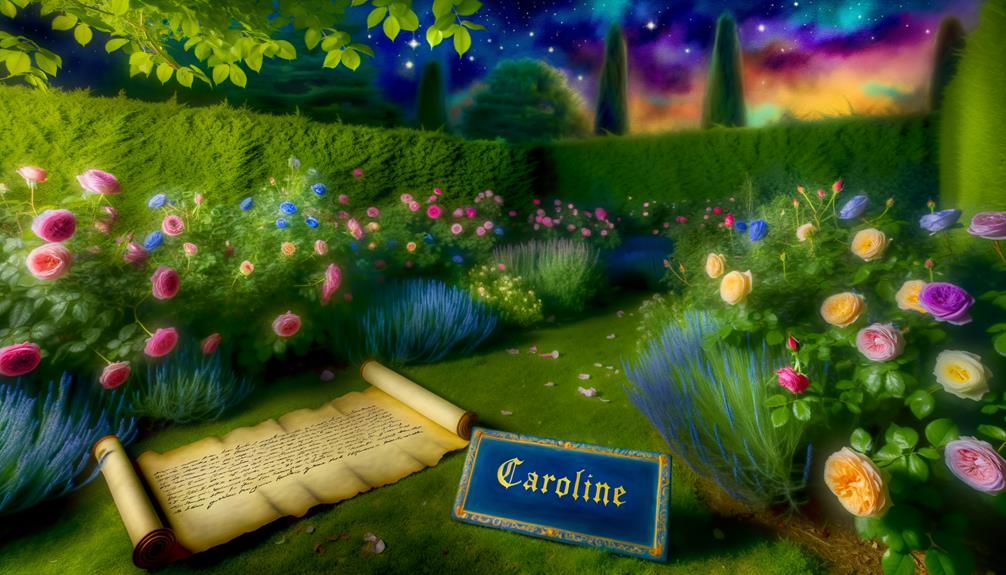Caroline Name Meaning and Origin
The name Caroline originates from the Old Germanic name Karl, meaning 'free man' or 'warrior,' reflecting notions of freedom and strength. Historically, Caroline has been associated with royalty and influential figures, bestowing an enduring legacy.
Its cultural significance varies, symbolizing sophistication in French culture, nobility in English-speaking regions, and purity in Scandinavian contexts. The name saw a peak popularity in the 1970s and 1980s in the United States and maintains a steady presence.
Prominent individuals named Caroline include astronomer Caroline Herschel and diplomat Caroline Kennedy. To explore Caroline's far-reaching influence and variations, continue exploring further.

Key Takeaways
- Caroline originates from the Old Germanic name Karl, meaning 'free man' or 'warrior'.
- The name reflects a rich heritage symbolizing freedom and strength.
- Caroline has significant cultural associations with elegance, nobility, and classic charm.
- It has been linked to royalty and notable historical figures.
- The name maintains stable popularity, especially in English-speaking regions.
Etymology of Caroline
The name Caroline originates from the Old Germanic name Karl, which means 'free man' or 'warrior.' This etymological root is significant, highlighting its linguistic evolution across various cultures and languages.
In Latin, Karl transformed into Carolus, which subsequently gave rise to the feminine form, Carolina, in Romance languages. The name Caroline embodies a rich linguistic heritage, symbolizing attributes of freedom and strength.
Its adoption across different societies underscores its adaptability and enduring appeal. The phonetic structure of Caroline has remained relatively consistent, retaining the core elements of its original Germanic form while acquiring a softer, more melodic resonance in its evolution to English and other languages.
This linguistic journey underscores the name's intricate etymological development.
Historical Significance
Drawing from its rich etymological roots, the name Caroline has historically been associated with numerous notable figures, illustrating its prominence and enduring legacy across various epochs. This name has graced the annals of history, from royalty to influential personalities in various fields. Below is a table highlighting some historical figures named Caroline, showcasing the name's widespread influence.
| Name | Era | Contribution |
|---|---|---|
| Queen Caroline of Ansbach | 17th Century | British monarchy |
| Caroline Herschel | 18th Century | Astronomy |
| Caroline Bonaparte | 19th Century | Napoleonic France |
| Caroline Norton | 19th Century | Social reform |
| Caroline Kennedy | 20th Century | American politics and diplomacy |
This table encapsulates the diverse roles played by individuals named Caroline, reflecting its historical significance.
Cultural Associations
In various cultures, the name Caroline has been imbued with distinct connotations and symbolic meanings, reflecting its adaptability and resonance across different societies. In French culture, Caroline is often associated with sophistication and elegance, while in English-speaking countries it is seen as a classic and timeless name. Its popularity and enduring appeal can be attributed to its ability to embody a sense of grace and charm. In fact, many parents choose the name Caroline for their daughters because of its traditional and timeless qualities. The Braden name meaning, on the other hand, is often linked to strength and bravery. In various cultures, the name Braden is associated with qualities such as resilience and determination. This reflects the adaptability and resonance of the name Braden across different societies. In Irish culture, the Braden name meaning is often tied to the concept of leadership and strong character. The name Braden also has roots in Scottish culture, where it is associated with a sense of honor and loyalty. Across different cultures, the name Braden continues to symbolize qualities of courage and fortitude, making it a popular choice for parents seeking a name with strong and positive connotations.
In French culture, Caroline often evokes an air of sophistication and elegance, while in English-speaking regions, it is associated with nobility and classic charm.
The name's roots in the Latin “Carolus” link it to the concept of strength and free spirit, underscoring its historical connection to leaders and royalty.
Moreover, in Scandinavian contexts, Caroline is perceived as embodying purity and simplicity.
These diverse cultural interpretations highlight the name's versatility and enduring appeal, making it a favored choice across linguistic and national boundaries.
Popularity Over Time
Reflecting its broad cultural significance, the name Caroline has experienced varying levels of popularity over different historical periods.
In the 19th century, Caroline saw a surge in use, particularly in English-speaking countries, due to its regal connotations and association with European royalty.
The name's popularity fluctuated throughout the 20th century, peaking in the 1970s and 1980s in the United States.
Statistical data from the Social Security Administration indicate that its appeal has remained relatively stable in the 21st century, consistently ranking within the top 100 names for newborn girls.
This enduring popularity can be attributed to its classic charm and the cyclical nature of naming trends, which often revive traditional names with historical resonance.
Famous Carolines
Numerous prominent individuals named Caroline have made significant contributions across various fields, underscoring the name's widespread influence and timeless appeal.
Caroline Herschel, a pioneering astronomer, advanced our understanding of the cosmos through her discovery of several comets in the 18th century.
Caroline Kennedy, a distinguished diplomat and author, has played a crucial role in American political and cultural spheres.
In the arts, Caroline Wozniacki, a renowned tennis player, has achieved global acclaim, marking her presence in sports history.
Caroline Myss, a leading author in the field of spiritual development, has influenced countless individuals through her writings and teachings.
These figures exemplify the enduring legacy and multifaceted impact of those who bear the name Caroline.
Variations and Nicknames
Beyond its association with notable figures, the name Caroline also boasts a variety of intriguing variations and affectionate nicknames that reflect its widespread cultural adoption. These variations and nicknames not only highlight linguistic diversity but also the adaptability of the name across different cultures and languages.
| Variation | Language/Region |
|---|---|
| Carolina | Spanish, Italian |
| Karolina | Polish, Czech |
| Karoline | German, Danish |
Common nicknames for Caroline include "Carrie," "Caro," and "Lina." Each of these diminutives offers a unique, informal twist on the classic name, allowing for a personalized touch that can be endearing and practical. Such variations and nicknames underscore the versatility and enduring appeal of the name Caroline in contemporary society.
Caroline in Literature and Media
Caroline has been a prominent name in literature and media, often chosen for characters that embody qualities of elegance, intelligence, and resilience.
In Jane Austen's 'Pride and Prejudice,' Caroline Bingley exemplifies sophistication and social acumen, albeit with a degree of vanity.
Similarly, in 'Coraline' by Neil Gaiman, the protagonist Caroline Jones—mistakenly called Coraline—demonstrates bravery and resourcefulness in a fantastical setting.
The television series 'Caroline in the City' features Caroline Duffy, a cartoonist maneuvering professional and personal challenges, showcasing modern independence and creativity.
These varied portrayals underscore the name's versatility and enduring appeal, reflecting a broad spectrum of human experiences and virtues, thereby cementing Caroline's significant presence in cultural narratives.
Conclusion
Concluding, Caroline's in-depth etymology, cultural connections, and chronological changes chart an enchanting course through history. Celebrated in literature and media, the name's lasting grace and evocative essence exude a timeless appeal.
Variations and nicknames further enrich its flexibility and vibrancy. Famous figures named Caroline underscore its notable societal impact.
Ultimately, the name Caroline remains a cherished beacon of beauty, blending historical heritage with contemporary charm.






